|
 Secure Site
Secure Site
|
 |
Archive for the 'Well-being' Category
 set your zen timer for a mini-meditation Memorize a three-to-five-word phrase, a mantra, that will bring you back to center when things get rough, such as “I am strong” or “Spirit will guide me.” Also, keep a peaceful image mentally on hand (a beach scene, a quiet forest) to call up in stressful moments. Set your Digital Meditation Timer with Chime for 5 minutes and sit silently repeating your phrase until the calming chime sounds.
adapted from Body + Soul Magazine
 digital timers for meditation and yoga with chime Now & Zen – The Meditation Timer Store
1638 Pearl Street
Boulder, CO 80302
(800) 779-6383
Posted in Chime Alarm Clocks, intention, Meditation Timers, Meditation Tools, mindfulness practice, Well-being, Zen Timers
 time for a rest Cold, dark, stormy winter is the season that makes us glad to live in buildings. This is the time when we want a lot less contact with the world outside our walls—and when the impact of whatever is inside our homes is intensified.
Winter is the season for slowing down, going within, resting, and reflecting; we tend to sleep longer, eat more, be less active, and feel more emotionally sensitive. As we move inward, we aren’t turning our back on the rest of life; we’re doing essentially the same things that the other animals and plants in our hemisphere are doing. When we don’t join them, we deprive ourselves of an important restorative experience.
Satisfy your soul
Winter is a good time to tune in to yourself. There’s no need to keep up the high energy levels of summer. It’s time to curl up on the couch under a lap robe with a mug of herbal tea and reflect on your life. It’s an especially good time to look around and notice whether your home nurtures you, renews you, and provides a safe place where you can hear the still, small voice within.
 Winter is a good time to tune in to yourself What do you long to come home to? If you work at a high-pressure job, you may need your home to be soft and peaceful. If your day is spent tending to the needs of others, you may want a corner where you can shut out the world. If much of your day is spent in solo pursuits, you may want your home to be a place for gathering with friends or family. If you have small children, it may seem especially difficult to carve out space and time for yourself—but no one needs it more than parents, and small gestures of self-love can go a long way.
When arranging their interior spaces, people often focus on the more public areas (entry, living room, dining room) and neglect their more private rooms (bedroom, study, bathroom). If your home is to be your place of renewal, your oasis in a crazy world, give to yourself! Think about what elements make you feel most at home: art objects, relaxing colors, sensuous fabrics, warm lighting, good music? Do you have at least one area where you can make the world go away and wrap yourself in love? What really helps you let go of tension? An overstuffed chair by a window where you can read a book and watch the storms rage outside? A steaming aromatherapy bath by candlelight? A homey dining table with warm, intimate lighting where you can share the day’s stories with your family? A sacred place for meditation? Filling the house with the smell of baking bread?
And how is your bedroom? Does it help you drift off to sleep relaxed and content, or is it decked out with piles of laundry, exercise equipment, and unpaid bills? The time you spend clearing up clutter and making your bedroom peaceful will pay you back in serenity and rejuvenating rest. How you wake up is important, too. What are the first things you see when you open your eyes in the morning? Do they help you feel good inside?
Transcend the fear of selfishness
The point of all this self-nurturing is not to isolate you in a bubble of indulgence. Quite the opposite; the point is to restore and maintain your vitality. Because all of life is interconnected, this is the basis of caring for all life. Furthermore, the better we understand our own organism’s needs, the more deeply we grasp the nature of life itself. The more depleted we are, the harder it is to care for other things—and a lot of us are pretty depleted. If we care about the earth and the life on it, we must include ourselves. It makes no sense to “save the planet” while abusing our own vitality with excessive busyness, sleep deprivation, and overwork. Somehow we bought the idea that it’s selfish to take care of ourselves, and that crazy notion has estranged us from the very pulse of life. Exuberant love of life is the most powerful place to come from, and that state arises naturally when we take good care of the life we have—not in ignorance of the rest of life, but in harmony with it.
adapted from Natural Home Magazine, November/December 2002 by Carol Venolia
One of the ultimate Zen like experiences is waking-up from a great slumber refreshed and energized. Your mind and body are harmoniously one, both alert and focused. Having a refreshed mind and body are two keys to a natural and Zen lifestyle. Waking up in the morning should not be a loud and abrupt awakening, but rather it should be a peaceful positive experience. The right natural alarm clock can transition your deep and tranquil sleep into a serene start to consciousness. Imagine a long-resonating Tibetan bell-like chime waking you up to a beautiful morning experience.
The right alarm clock can be the most beneficial investment for you. With our Now & Zen natural alarm clock you are awakened more gradually and thus more naturally. Now & Zen is focused on creating a naturalistic lifestyle, and our clocks are an example of our philosophy.
 Chime Alarm Clock, a meditatin timer for those times you can sit and be mindful Now & Zen – Chime Alarm Clock for a Progressive Awakening
1638 Pearl Street
Boulder, CO 80302
(800 779-6383
Posted in mindfulness practice, Well-being
 tips for staying healthy this holiday season As the chill of winter arrives, so does the prospect of congestion and coughing, sore throats and sniffles, and other less-than-desirable symptoms.
But you might have noticed that colds, flus, and other seasonal blights seem to hit some people again and again, while others coast through to spring unscathed. Is this punishment random, like a tornado, or is there a method to the cold-and-flu madness?
There is indeed a method. While we can all help prevent viral and bacterial infections by washing hands regularly and avoiding germ-laden surfaces, it’s not just the bugs we encounter that determine how healthy we are. Our well-being also depends on how prepared our bodies are to fight them.
An entire field of research called psychoneuroimmunology has bloomed in recent years. It aims to uncover the links between the brain, behavior, and the immune system. One of its primary targets is the universal phenomenon known as stress.
We’ve all experienced the nasty cold that comes after a deadline, and scientific evidence has borne out this pattern, with clinical studies showing that psychological stress can weaken defenses and slow recovery from illnesses small and large. A recent study from the University of California, Los Angeles, in fact, found that the effects of stress play out at the cellular level: Hormones cued by emotional stress make immune cells age faster.
What is stress? “It’s our body’s response to something that taxes or exceeds our resources, whether from external pressures or our own internal worries,” says Frances Cohen, a psychologist at the University of California, San Francisco. What feels stressful depends on a person’s reaction to a given circumstance. “For some people, getting divorced is a positive step,” she says. “But for others, it’s devastating.” When we perceive something as harmful, our brain triggers hormones such as cortisol, which can affect the immune system. “You can trace it from the brain through the body,” Cohen says.
After stress hormones pour into the bloodstream, “the body tries to correct itself, to bring itself back into homeostasis,” she adds. So if the stress is brief, the hormones dissipate, and the body returns to normal. In one study, her group found that people who lost their jobs had lower levels of an important class of immune cell. However, she says, “we saw a recovery of immune levels, a bouncing back, in people who got a new job.”
 reduce stress Stress that lasts over a long period of time proves far more damaging to our bodies than short-term stress. A study published earlier this year, for instance, found that consistently high levels of perceived stress could reduce women’s ability to fight an infection from human papilloma virus (HPV), which can cause cervical cancer; no such effect occurred with one-time stressful events such as job loss.
And in a preliminary study published in August, researchers studied people caring for family members with chronic illnesses (a long-term stressor); compared with a control group, the caregivers’ white blood cells were less responsive to cortisol and more responsive to a pro-inflammatory compound — leaving their bodies in a state of chronic inflammation.
Exercise and Sleep
Immunity isn’t all in your head, of course; day-to-day physical habits matter a great deal. Exercise, sleep, and nutrition in particular have strong links to immunity — and, not coincidentally, to our mental well-being.
Start with fitness: Those who exercise regularly, says Monika Fleshner, Ph.D., a professor of integrative physiology at the University of Colorado at Boulder, acquire a resiliency that makes them less susceptible to health problems. “This is especially important when we’re stressed and as we age,” says Fleshner.
Interestingly, more exercise isn’t necessarily better. “While too little exercise is bad for the immune system, too much is just as bad,” she notes. Athletes who exercise strenuously may have higher rates of respiratory infections. Just the right amount of movement helps maintain a healthy weight, which in turn plays a role in how well we battle colds and flus: People who are obese have diminished immune responses and more severe infections.
The fact that many Americans don’t get enough sleep and rest spells bad news for our immune systems, too, says Motivala, increasing the risk of conditions ranging from frequent colds to diabetes. “A normal sleep cycle is vitally important for immune function,” he explains, since immune cells circulate throughout the body according to cycles of sleep and wakefulness. Their levels in the blood peak around midnight, then gradually return to lymph nodes as we sleep. A lack of sleep interrupts this process, lowering levels of “natural killer” cells, important first-line defenders against infections.
 prioritize shut-eye
Prioritize Shut-Eye
Evidence shows that sleep has wide-ranging effects on immunity. Most of us need about eight hours a night, but quality matters just as much. “Keep track of how you feel in the morning,” says Sarosh Motivala. A little grogginess is fine, but you shouldn’t be dragging. “If you’re waking up tired, it doesn’t matter if you had eight hours or five hours, something is not right,” he says. Sleep problems can arise from a number of sources, including stress, a poor diet, or a sedentary lifestyle, so talk to your doctor or alternative health therapist to identify the cause in each case. Be sure to treat yourself gently in the morning by waking progressively over a 10 minutes period of time with The Zen Alarm Clock with Chime.
One of the ultimate Zen like experiences is waking-up from a great slumber refreshed and energized. Your mind and body are harmoniously one, both alert and focused. Having a refreshed mind and body are two keys to a natural and Zen lifestyle. Waking up in the morning should not be a loud and abrupt awakening, but rather it should be a peaceful positive experience. The right natural alarm clock can transition your deep and tranquil sleep into a serene start to consciousness. Imagine a long-resonating Tibetan bell-like chime waking you up to a beautiful morning experience.
The right alarm clock can be the most beneficial investment for you. With our Now & Zen natural alarm clock you are awakened more gradually and thus more naturally. Now & Zen is focused on creating a naturalistic lifestyle, and our clocks are an example of our philosophy.
adapted from Body + Soul, November 2008
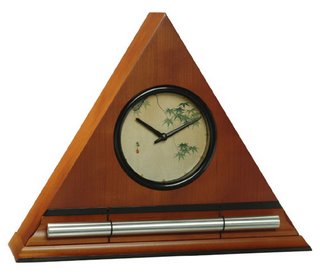 chime alarm clocks and natural sounding timers for a gentle wake up
Now & Zen – The Soothing Chime Alarm Clock Store
1638 Pearl Street
Boulder, CO 80302
(800) 779-6383
Posted in sleep, Sleep Habits, Well-being
Research published in the last two years shows that certain slow activities–like gentle yoga or gardening–can reduce your stress level and blood pressure and improve your body’s ability to regulate sugar. Past studies have shown that other habits like meditation can help reduce chronic pain and enhance mental clarity. The first step to finding “slowness”is to clear some room in your life–watch less TV or spend less time browsing at the mall. “Jettison the clutter that clogs up your schedule,” says Carl Honoré, author of In Praise of Slowness (HarperOne, 2004). “When you focus on the things that are important at work or at home you can enjoy those things more,”he says. You can also take a more relaxed approach to the things you already do and adopt new habits that require mindfulness. “It’s one thing to say you’re going to slow down, but a slow hobby helps you put those words into practice,” says Honoré. To get you started we’ve come up with seven ways to destress and reenergize.
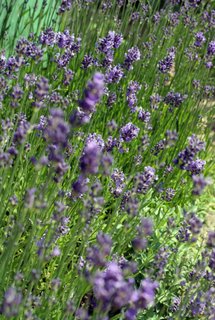 gardening is a great mindfulness practice that cultivates stillness of mind 1. Become a Gardener
Caring for flowering plants may help you relax and get grounded. In 2004, researchers at Japan’s Utsunomiya University found repotting plants lowered fatigue and promoted physiological relaxation in study participants, and that working with flowers seemed to have a stronger positive effect than working with nonflowering plants.
HEALTH BENEFITS Research shows that exposure to plants–and even just looking at them–can reduce blood pressure, increase concentration and productivity, and help you recover from illness, says Andy Kaufman, Ph.D., assistant professor of tropical plant and soil sciences at the University of Hawaii in Honolulu. He cites a classic 1984 study, published in Science, which showed that even the view of a green garden helped surgical patients recovering from gall bladder surgery. Among a group of 46 patients in a Pennsylvania hospital, the 23 who had rooms with windows facing greenery had shorter postoperative stays and needed fewer pain–relieving analgesics than the 23 whose windows faced a brick wall.
GETTING STARTED If you live in an apartment or don’t have much room to garden, invest in the EarthBox (earthbox.com), a self–watering container garden that comes with potting soil and fertilizer. “Even if you have a brown thumb, you can grow things [in it],”says David Ellis, American Horticulture Society spokesperson. You could also join a community garden; visit ahs.org, the American Horticulture Society’s website, for more info.
 yoga helps to slow us down 2. Practice Slow Yoga
Slow yoga emphasizes one drawn–out breath for each movement you make. Like tai chi, it uses many repetitive flowing moves. “When you practice slow yoga, you create more awareness between mind and body,”says Beth Shaw, founder of Yoga Fit Training Systems in Los Angeles. This creates a deep sense of stillness and helps develop patience and lower stress, she adds.
HEALTH BENEFITS Last year, researchers in Sweden and India showed that practicing yoga can reverse the negative effects of high blood pressure, obesity, and high blood sugar. The studies, published in the journal Diabetes Research and Clinical Practice, showed reduced waist circumference, blood pressure, blood sugar, and triglycerides (the chemical form of fat cells) and higher HDL (so–called good cholesterol) levels in a control group that practiced yoga versus a placebo group.
GETTING STARTED To find a Slow Yoga class near you visit yogafit.com or inquire at your local yoga studio. You might also consider restorative or yin yoga, two other gentle forms of the practice.
 Take a nap 3. Take a Nap
You snooze, you win, according to a Harvard study published last year in The Archives of Internal Medicine. Researchers revealed that people who regularly napped at least three times a week for an average of 30 minutes had a 37 percent lower risk of heart attack than those who didn’t nap. “It shows that napping is an important preventive strategy just like regular exercise, eating right, and not smoking,”says Sara C. Mednick, Ph.D., author of Take a Nap! Change Your Life (Workman, 2006).
HEALTH BENEFITS A daily nap also boosts serotonin, says Mednick, which may lead to improved memory and performance. Napping can even contribute to weight loss, according to a study in the American Journal of Physiology, Endocrinology, and Metabolism in 2007. That study looked at hormone levels in 41 men and women who were part of a seven–day sleep–deprivation experiment. Those allowed to nap for two hours following a night without any sleep showed a significant drop in cortisol, a hormone related to high levels of stress, and a complement of growth hormone, which helps regulate insulin and fat storage. Researchers concluded that a midafternoon nap improves alertness and performance and reverses the negative metabolic effects of sleep loss.
GETTING STARTED The best time to nap is between 1 p.m. and 3 p.m., but a 15– to 20–minute power nap at any time can help. Set your Zen Alarm Clock for 20 minutes. Close the office door and take a snooze, or find a quiet place where you feel safe. Nap on weekends, Mednick says. “Just don’t use the weekend to catch up on sleep lost in the week.”Check with your doctor about napping if you’re being treated for insomnia.
4. Start a Slow Hobby
 learning to paint Hobbies that require mindful, solitary activity–such as knitting, painting, sculpting, crocheting, or quilting–can act as a brake on your hectic pace.
HEALTH BENEFITS “Slow hobbies help you cultivate the lost art of concentration and being in the moment. They have a meditative quality to them,”says author Carl Honorè. “And that calming effect goes beyond the act itself. Maintaining that inner stillness enables you to negotiate the fast–moving waters of the rest of your day.”
GETTING STARTED Sixty–four percent of people who knit or crochet say they use these crafts to help them reduce stress and relax, according to the Craft Yarn Council of America. Visit craftyarncouncil.com for information. To learn about drawing, visit drawspace.com. Check with a local college or community center for other craft classes.
5. Eat Slowly
Eating too fast creates stress in the body, says nutritionist Marc David, author of The Slow Down Diet (Healing Arts Press, 2005). That causes a spike in cortisol and insulin, which in turn diminishes your ability to burn calories and makes you more likely to gain weight. Eating quickly also leads to overeating. “The brain demands more food if it doesn’t have time to register its needs for taste, aroma, and satisfaction,”says David.
HEALTH BENEFITS Taking time to eat creates a relaxation response, which means you’ll have fewer digestive complaints and your body will be able to take in the nutrients it needs. Plus “we make better food choices, and we know when to stop,”he adds.
GETTING STARTED To ease the pace, double the time you spend on your meals; for example, if you usually eat breakfast in five minutes, stretch it out to ten. “Focus on your food: Taste it, enjoy it, notice it, savor it,”says David. “Find relaxed time between bites by slowing down your internal conversation. Let go of any sense of urgency, and allow the moment to be sensual.”The cooking process can help you slow down too, says David. “Instead of microwaving something, make a soup from scratch.”
6. Do One Thing at a Time
A lot of us believe we get more done by multitasking. But research at the University of Michigan published in the Journal of Experimental Psychology in 2001, shows the opposite is true. “If you concentrate on one task at a time, you get more done faster and make fewer mistakes,” says David E. Meyer, director of the Brain, Cognition, and Action Laboratory at the University of Michigan.
HEALTH BENEFITS Taking on chores one at a time reduces chronic stress and protects your short–term memory, which comes under fire if the brain is overtaxed.
GETTING STARTED To curb outside distractions and focus better, set aside time when you can concentrate on one activity from start to finish. For example, check e–mail once an hour and turn off your instant messaging; let your phone messages go to voice mail and only check them occasionally throughout the day.
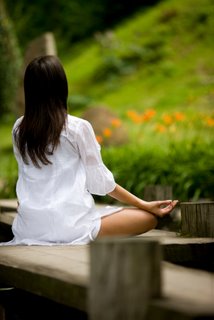 practice meditation in order to slow down 7. Meditate
“Meditation teaches us to focus,”says Steven Hartman, director of professional training at the Kripalu Health and Yoga Center (kripalu.org) in Stockbridge, Mass. “All day your mind is chattering. When you meditate, you can hear your own inner wisdom.”
HEALTH BENEFITS Studies have shown that practicing meditation also improves blood pressure, fortifies the immune system, and promotes a sense of well–being. “A daily meditation practice can bring body, breath, mind, and spirit into balance,”says Hartman.
GETTING STARTED Check out a program like Transcendental Meditation. (See tm.org.) Or begin at home: “Put an egg timer on and stay with your breath for just two and a half minutes,”says Hartman. “Keep your spine tall and straight and allow the breath to be natural.”If you’re seated on the floor, a cushion can raise your pelvis and bring your spine into a natural position. As you get comfortable with the practice, you can increase your time to 15 or 30 minutes a day.
adapted from Natural Health Magazine, by Chrystle Fiedler
One of the ultimate Zen like experiences is waking-up from a great slumber refreshed and energized. Your mind and body are harmoniously one, both alert and focused. Having a refreshed mind and body are two keys to a natural and Zen lifestyle. Waking up in the morning should not be a loud and abrupt awakening, but rather it should be a peaceful positive experience. The right natural alarm clock can transition your deep and tranquil sleep into a serene start to consciousness. Imagine a long-resonating Tibetan bell-like chime waking you up to a beautiful morning experience.
The right alarm clock can be the most beneficial investment for you. With our Now & Zen natural alarm clock you are awakened more gradually and thus more naturally. Now & Zen is focused on creating a naturalistic lifestyle, and our clocks are an example of our philosophy.
 Zen Meditation Timers with Soothing Chime Now & Zen – Soothing Chime Alarm Clock & Timer Store
1638 Pearl Street
Boulder, CO 80302
(800) 779-6383
Posted in Chime Alarm Clocks, intention, Meditation Timers, Meditation Tools, mindfulness practice, Natural Awakening, Now & Zen Alarm Clocks, sleep, Sleep Habits, wake up alarm clock, Well-being, yoga, Yoga Timer, Yoga Timers by Now & Zen, Zen Alarm Clock, Zen Timers
 winter hibernation In the depths of winter, do you find yourself wanting to sleep more, eat more and curl up by the fire? We often behave as if seasonal changes are irrelevant to a modern lifestyle. After all, in many ways, civilization is all about overcoming nature. But our bodies are evolutionarily old and remember how weather once dictated behavior. In winter, we hunkered around a fire, repairing tools and telling tales that wove our culture. We packed our bodies close and slept long.
Now we act as if it’s always summer, demanding consistently high productivity at work and at home. But our bodies require cycles of activity and rest—daily, annually. When days are long, our metabolisms and energy levels amp up. In winter, we produce hormones that make us sleepy, giving us time to restore body, mind and soul.
And there’s nothing wrong with that cycle—except that we work against it, forcing ourselves to operate at summer levels even in winter. No wonder so many people feel depressed at this time of year!
How SAD is that?
You’ve probably heard of Seasonal Affective Disorder, or SAD. You might even suffer from it—as many as half a million U.S. citizens do, according to the American Academy of Family Physicians. The fact that most clinicians address the issue via technology (daily exposure to high-intensity electric light) and/or medication provides an interesting perspective on our time. But some have noted that SAD’s symptoms have more in common with hibernation than with clinical depression.
Could SAD be a result of modern living’s demand to move at top speed all day, every day—and mostly indoors, disconnected from the sun’s cycles? Could we give in to a bit of hibernation?
 Time for Winter's Nap
Oh, to hibernate!
Hibernation is a survival strategy some animals use to get through foodless winters. Though humans don’t hibernate, some cultures have come close.
In 1900, the British Medical Association published a description of winters among Russian peasants. For centuries, they survived scant winter food by engaging in lotska—sleeping the whole season away. “At the first fall of snow the whole family gathers round the stove, lies down, ceases to wrestle with the problems of human existence and quietly goes to sleep.”
The peasants woke daily to eat some bread and drink some water and then dropped off again, taking turns keeping the fire going. After six months, “the family wakes up, shakes itself, goes out to see if the grass is growing, and by-and-by sets to work at summer tasks,” the article states.
In a 2007 New York Times editorial, historian Graham Robb similarly described rural 19th-century France:
Economists and bureaucrats who ventured out into the countryside after the Revolution were horrified to find that the work force disappeared between fall and spring…Villages and even small towns were silent, with barely a column of smoke to reveal a human presence. As soon as the weather turned cold, people all over France shut themselves away and practiced the forgotten art of doing nothing at all for months on end.
 slowing down
Dreaming of a better world
What if we indulged our inclination to slow down in winter? We’d sleep more and demand less from ourselves. We’d be more inward and reflective. I once met an artist who had mastered this. Perusing her work, I asked how she stayed creative as a painter, writer, weaver and sculptor. Her answer:
She changes media each season. In summer she’s out on her deck chiseling a sculpture. In fall, she is reflective and poetic. In winter, she works with warm fiber at her loom. And as spring beckons her outdoors, she sets up her easel in the meadow. Should our lives be any less a work of seasonal art?
One of the ultimate Zen like experiences is waking-up from a great slumber refreshed and energized. Your mind and body are harmoniously one, both alert and focused. Having a refreshed mind and body are two keys to a natural and Zen lifestyle. Waking up in the morning should not be a loud and abrupt awakening, but rather it should be a peaceful positive experience. The right natural alarm clock can transition your deep and tranquil sleep into a serene start to consciousness. Imagine a long-resonating Tibetan bell-like chime waking you up to a beautiful morning experience.
The right alarm clock can be the most beneficial investment for you. With our Now & Zen natural alarm clock you are awakened more gradually and thus more naturally. Now & Zen is focused on creating a naturalistic lifestyle, and our clocks are an example of our philosophy.
Adapted from Natural Home Magazine, January/February 2009 by Carol Veniola
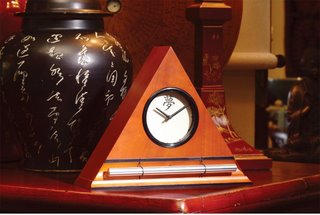 Zen Alarm Clock Now & Zen – Natural Chime Alarm Clock Store
1638 Pearl Street
Boulder, CO 80302
(800) 779-6383
Posted in Japanese Inspired Zen Clocks, Natural Awakening, Now & Zen Alarm Clocks, sleep, Sleep Habits, wake up alarm clock, Well-being
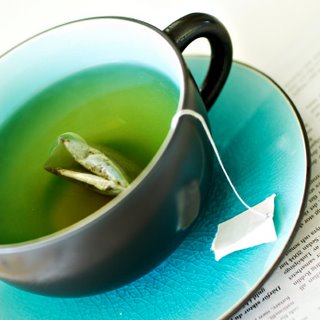 Natural Remeadies for the Winter Season Natural Remedies for the Winter Season.
A cup of tea made with ginger (Zingiber officinale) can help ease congestion and warm the body, which helps your system fight infection. Its anti-inflammatory properties make it a good sore-throat remedy, too.
How to use: Set your Zen Alarm Clock & Timer for 20 minutes. Simmer fresh or dried ginger for 20 minutes; strain and add a touch of honey and a squeeze of lemon, if desired. Incorporate ginger liberally into stir-fries and soups too!
adapted from Body + Soul Magazine, 2009
“The Zen Alarm Clock & Chime Timer‘, uses soothing acoustic chimes that signal it’s time – gently and gradually.
Rather than an artificial recorded sound played through a speaker, the Zen Clock features an alloy chime bar similar to a wind chime. When the clock’s alarm is triggered, its chime produces a long-resonating, beautiful acoustic tone reminiscent of a temple gong.
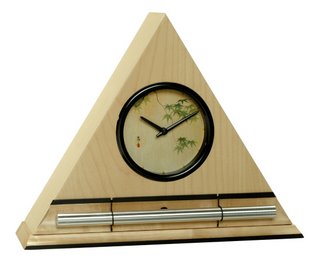 Zen Alarm Clock in Maple Finish with Maple Leaves Dial Face and Chime
Now & Zen – The Zen Timer Store
1638 Pearl Street
Boulder, CO 80302
(800) 779-6383
Posted in Well-being, Zen Timers
 Meditation Calms the Mind What It Does
Quiets your mind and hones your focus so you are fully present in this workout. Because the solar plexus is associated with the third chakra, you focus on the color yellow, which is linked to this energy center of the body and believed to inspire confidence, will, and personal power.
How to Do It
Lie back in Corpse pose, palms facing up. Picture a yellow flower, its petals fully open, at your solar plexus. With eyes closed, imagine it floating up with each inhalation and down with each exhalation, riding a slow, gentle wave. Set your Meditation Timer for 5 minutes. Focus on your breath and the flower for two to five minutes.
adapted from Body + Soul
Use our unique “Zen Clock” which functions as a Yoga & Meditation Timer. It features a long-resonating acoustic chime that brings your meditation or yoga session to a gradual close, preserving the environment of stillness while also acting as an effective time signal. Our Yoga Timer & Clock can be programmed to chime at the end of the meditation or yoga session or periodically throughout the session as a kind of sonic yantra. The beauty and functionality of the Zen Clock/Timer makes it a meditation tool that can actually help you “make time” for meditation in your life. Bring yourself back to balance.
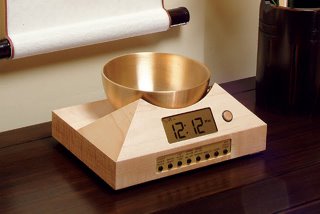 Tibetan Bowel Meditation Timers
Now & Zen – The Zen Meditation Timer and Alarm Clock Store
1638 Pearl Street
Boulder, CO 80302
(800 779-6383
Posted in intention, Meditation Timers, Meditation Tools, mindfulness practice, Well-being, yoga, Yoga Timer, Yoga Timers by Now & Zen, Zen Timers
 meditating on a rock At Harvard Medical School’s Mind-Body Medical Institute, Dr. Herbert Benson and colleagues teach a technique they call the Relaxation Response, which is a demystified system of meditation, modeled directly on Transcendental Meditation (TM), a type of yogic mantra meditation. Numerous studies have shown that when you quiet the mind with these techniques, a variety beneficial physiological responses—including reduced heart rate, breathing rate, blood pressure, and levels of stress hormones—result, benefiting conditions from migraines to high blood pressure to infertility.
adapted from Yoga Journal, Yoga Therapy and the Mind-Body Connection, Part 1 by Timothy McCall, M.D.
Use our unique “Zen Clock” which functions as a Yoga & Meditation Timer. It features a long-resonating acoustic chime that brings your meditation or yoga session to a gradual close, preserving the environment of stillness while also acting as an effective time signal. Our Yoga Timer & Clock can be programmed to chime at the end of the meditation or yoga session or periodically throughout the session as a kind of sonic yantra. The beauty and functionality of the Zen Clock/Timer makes it a meditation tool that can actually help you “make time” for meditation in your life. Bring yourself back to balance.
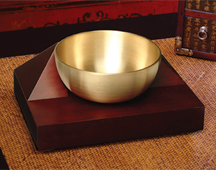 Singing Bowl Meditation Timer from Now & Zen, Inc. Now & Zen’s Singing Bowl Meditation Timer Store
1638 Pearl Street
Boulder, CO 80302
(800) 779-6383
Posted in intention, wake up alarm clock, Well-being, yoga, Zen Alarm Clock
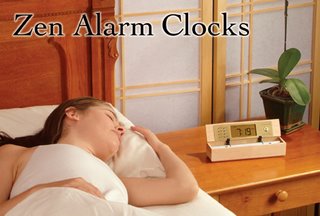 Five tips to fall asleep faster Having trouble falling asleep? Try these tried and true methods to help you fall asleep faster.
Take a walk. In Chinese medicine, insomnia caused by your brain’s inability to shut off the day’s stress is called “disturbed shen qi,” or a disturbed mental spirit. Releasing daytime stress before bedtime by taking a brisk walk or a warm bath is often more effective than taking a sedative.
Turn down the heat. Most people sleep more soundly in a cool room. A 2004 University of South Australia study found that the body needs to drop its core temperature for sleep to initiate normally.
Pump up the serotonin. Serotonin is a natural hormone associated with inducing sleep. Deficiencies in tryptophan, vitamin B6, niacin, magnesium or other nutrients can inhibit the hormone’s functioning. The best way to maintain proper nutrient levels is to eat a balanced diet. A daily multivitamin may help supplement dietary gaps. If you suspect a severe serotonin deficiency, consult your medical health professional.
Take charge with the 20-minute rule: If you lie sleepless for more than 20 minutes, get up and do a task. Get your mind out of the circular problem of being kept awake by the inability to fall asleep. Read, iron that pile of clothes or write in your journal.
Balance your blood sugar: If you’re not sleeping well, ask your doctor about testing your blood sugar levels. People suffering from hypoglycemia can experience blood sugar fluctuations at night. A drop in blood sugar signals the body to produce hormones and neurotransmitters that stimulate sugar release, which may wake you up. If you are hypoglycemic, ask your health care provider whether nutritional measures are appropriate for you.
One of the ultimate Zen like experiences is waking-up from a great slumber refreshed and energized. Your mind and body are harmoniously one, both alert and focused. Having a refreshed mind and body are two keys to a natural and Zen lifestyle. Waking up in the morning should not be a loud and abrupt awakening, but rather it should be a peaceful positive experience. The right natural alarm clock can transition your deep and tranquil sleep into a serene start to consciousness. Imagine a long-resonating Tibetan bell-like chime waking you up to a beautiful morning experience.
The right alarm clock can be the most beneficial investment for you. With our Now & Zen natural alarm clock you are awakened more gradually and thus more naturally. Now & Zen is focused on creating a naturalistic lifestyle, and our clocks are an example of our philosophy.
adapted from Natural Home, November/December 2010
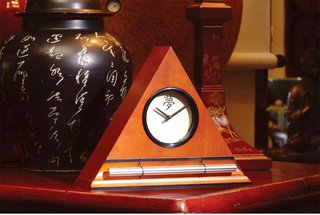 Gentle Wake Up Alarm Clocks with Chimes Now & Zen – The Natural Chime Alarm Clock Store
1638 Pearl Street
Boulder, CO 80302
(800) 779-6383
Posted in Insomnia, Natural Awakening, Now & Zen Alarm Clocks, sleep, Sleep Habits, wake up alarm clock, Well-being
 How to have more energy in the morning It’s often hard to find the inspiration to get out of your nice, comfortable bed when you’re still so tired. But according to Kundalini yoga, a built-in supply of energy lies dormant at the root of the spine, like a bulb that rests underground, waiting for a cue to bloom. By accessing this vitality, you’ll have the charge you need to fire up your day — without having to resort to a double latte.
“When you awaken your Kundalini energy and get it flowing up your spine,” says Maya Fiennes, a London yoga teacher and star of the DVD “Kundalini Yoga to Detox and Destress,” “you become alert and uplifted instead of sluggish and stressed.” We worked with Fiennes to develop this series of simple moves that stretch and strengthen the spine, increase vitality, reduce tension, release impurities, and improve focus — everything you need to face what lies ahead.
Camel Ride (pictured)
Targets
The lower spine.
What It Does
Releases lower-back tension, opens the hips, stimulates the digestive and immune systems, and promotes mental focus. “When you flex the spine,” says Fiennes, “you flex the mind.”
How to Do It
Sit cross-legged on the floor with your hands resting on your ankles. Bring your ribs and chest forward, gently arching your back, as you inhale. Then move the rib cage backward and round your lower spine as you exhale. Keep your neck relaxed and your chin parallel to the ground. Continue doing this exercise in unison with your breath for about two minutes, set your zen timer to repeat every 2 minutes and repeat six times.
Sufi’s Circle
Targets
The middle spine.
What It Does
Creates more space in the torso and encourages the lungs to expand; further stimulates digestion; soothes the nervous system. “The spiral is a familiar pattern in nature,” says Fiennes. “It’s very calming to move this way.”
How to Do It
Inhale and rotate your ribs forward and to the right, then exhale as you continue back and to the left, drawing a big circle with your chin and rib cage. Your spine will arch slightly and then round throughout the exercise. Rest your hands on your knees, using them for leverage. After two minutes, reverse and repeat for two more minutes.
Spinal Twist
Targets
The upper spine.
What It Does
Promotes detoxification; stimulates the lymphatic system; encourages energy to flow throughout the spine.
How to Do It
Sit with your hands on your shoulders, elbows parallel to the ground, and shoulders relaxed. As you inhale, twist your torso, shoulders, and head to the right. Exhale and twist to the left. Alternate between the right and left sides, gradually increasing your pace. After a minute, make the “okay” symbol with your fingers and begin to slowly straighten your arms with each twist until they are straight above your head. To finish, bring your hands into a prayer position and feel the energy coursing along your spine.
One of the ultimate Zen like experiences is waking-up from a great slumber refreshed and energized. Your mind and body are harmoniously one, both alert and focused. Having a refreshed mind and body are two keys to a natural and Zen lifestyle. Waking up in the morning should not be a loud and abrupt awakening, but rather it should be a peaceful positive experience. The right natural alarm clock can transition your deep and tranquil sleep into a serene start to consciousness. Imagine a long-resonating Tibetan bell-like chime waking you up to a beautiful morning experience.
The right alarm clock can be the most beneficial investment for you. With our Now & Zen natural alarm clock you are awakened more gradually and thus more naturally. Now & Zen is focused on creating a naturalistic lifestyle, and our clocks are an example of our philosophy.
adapted from Body + Soul, March 2008 by Kate Hanley
 Solid maple and walnut clocks use chimes to emulate Tibetan bells to wake you
Now & Zen’s Natural Alarm Clock Store
1638 Pearl Street
Boulder, CO 80302
(800) 779-6383
Posted in intention, mindfulness practice, Natural Awakening, sleep, wake up alarm clock, Well-being, yoga, Zen Alarm Clock
« Previous Page — « Previous Entries
Next Entries » — Next Page »
|
|
|
|